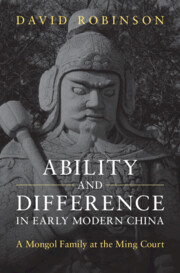Book contents
- Ability and Difference in Early Modern China
- Ability and Difference in Early Modern China
- Copyright page
- Contents
- Figures, Maps, and Tables
- Preface
- Emperors of the Ming Dynasty
- Acknowledgments
- Abbreviations
- Additional material
- Introduction
- 1 An Age of Decisions
- 2 Dying for His Lord
- 3 The Sovereign’s Man
- 4 Educating the Entitled
- 5 Representing the Emperor
- 6 Far from Home
- 7 Patronage, Assessment, and Power
- 8 Holding against the Storming
- 9 Turning Every Page
- 10 Seizing Fortune
- Conclusion
- References
- Index
Introduction
Published online by Cambridge University Press: 10 September 2025
- Ability and Difference in Early Modern China
- Ability and Difference in Early Modern China
- Copyright page
- Contents
- Figures, Maps, and Tables
- Preface
- Emperors of the Ming Dynasty
- Acknowledgments
- Abbreviations
- Additional material
- Introduction
- 1 An Age of Decisions
- 2 Dying for His Lord
- 3 The Sovereign’s Man
- 4 Educating the Entitled
- 5 Representing the Emperor
- 6 Far from Home
- 7 Patronage, Assessment, and Power
- 8 Holding against the Storming
- 9 Turning Every Page
- 10 Seizing Fortune
- Conclusion
- References
- Index
Summary
The Introduction lays out the book’s arguments, organization, and significance. The basic arguments are: (1) there was more to the military than war; (2) there was more to government than civil officials; and (3) there was more to China than the Han majority. The story of the Wu family is told at three levels: (1) the professional and family lives of each generation of the men to hold the title Marquis of Gongshun, (2) broader events and trends occurring in Ming politics, society, economics, religion, and ethnic relations, and (3) periodic consideration of the big picture, that is, thinking about the Ming dynasty in its Eurasian context. Nearly all polities confront issues of ability and difference as they secure people of ability through means such as hereditary status, meritocratic evaluations, and patronage. Simultaneously, polities like the Ming dynasty developed institutional means to acknowledge and whenever possible leverage differences such as ethnicity, gender, professional training, and relation to the throne.
Keywords
Information
- Type
- Chapter
- Information
- Ability and Difference in Early Modern ChinaA Mongol Family at the Ming Court, pp. 1 - 22Publisher: Cambridge University PressPrint publication year: 2025
Accessibility standard: Inaccessible, or known limited accessibility
Why this information is here
This section outlines the accessibility features of this content - including support for screen readers, full keyboard navigation and high-contrast display options. This may not be relevant for you.Accessibility Information
Content Navigation
Allows you to navigate directly to chapters, sections, or non‐text items through a linked table of contents, reducing the need for extensive scrolling.
Provides an interactive index, letting you go straight to where a term or subject appears in the text without manual searching.
Reading Order & Textual Equivalents
You will encounter all content (including footnotes, captions, etc.) in a clear, sequential flow, making it easier to follow with assistive tools like screen readers.
Visual Accessibility
You will still understand key ideas or prompts without relying solely on colour, which is especially helpful if you have colour vision deficiencies.
Structural and Technical Features
You gain clarity from ARIA (Accessible Rich Internet Applications) roles and attributes, as they help assistive technologies interpret how each part of the content functions.
